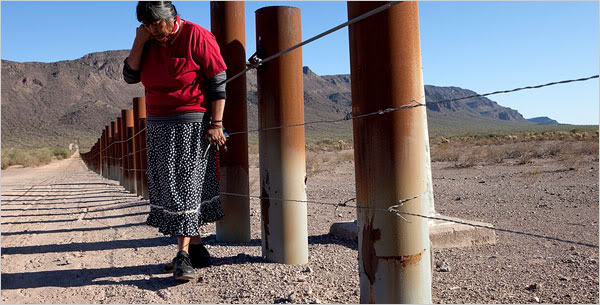Open Question: Could Tribes Face Fallout from Immigration Battles in the US?
When it comes to “illegal immigration” debates in general, count me among the Aboriginal people who find the concept just a tad ironic in the case of the United States.
But last week, in what some call “the toughest crackdown on illegal immigration in the country,” the governor of Arizona — home to some 20 tribes and 250,000 Indians who, collectively, occupy one-quarter of the state — signed into law a bill (aka SB 1070) requiring local and state police to “question anyone they suspect of being undocumented,” writes Maureen Linke of the CNN Newsroom. It also “targets those who hire illegal immigrant day laborers or knowingly transport them.”
According to a Reuters report, the law (set to take effect in 90 days, or around late July/early August 2010) “has raised fears that Hispanic immigrants could be racially profiled.” The report goes on to say that the “majority of the 11 million people believed to be living illegally in the United States are immigrants from Mexico.”
Here are my open questions:
Q1: Have the Indigenous peoples of this region now called Arizona been caught in the fallout from the illegal immigration debate?
Q2: Are you worried that Indigenous peoples in Arizona will be adversely affected once the law is enforced by police?
Now, I am not at all conversant with the broader cultural history of this region, so I cannot speak with any authority as to what degree of commonality might exist between the Indigenous peoples on both sides of the imposed US/Mexico border. Accordingly, can people comment as to these possible parallels in terms of culture, ancestry, and socio-economic status and their potential for a kind of ‘illegalized Indian-ness’?
As for a more northerly perspective on such matters, I do know that Canada once forced Indians who went off-reserve to carry passes on their person at all times. (Scholars and critics now debate whether the policy was necessarily enforced all that rigorously, or was even all that effective, but the effort and intent was there all the same.)
Hm… I wonder if Arizona police officers would accept Indian Status cards as valid? Maybe, maybe not.
[Image via strainreview.com]
The state is home to over 250,000 Native Americans (2000 Census). Reservations and tribal communities comprise over a quarter of
Arizona’s lands.



I can't imagine the outrage I would feel if I were from one of the tribes in the area and was 'asked for my papers'!
This is a dangerous way to approach illegal immigration and I definitely think it's going to be felt by the area's original inhabitants.
If I were living in Arizona I know I would certainly be nervous.
I can't imagine the outrage I would feel if I were from one of the tribes in the area and was 'asked for my papers'!
This is a dangerous way to approach illegal immigration and I definitely think it's going to be felt by the area's original inhabitants.
If I were living in Arizona I know I would certainly be nervous.
Great “open questions” — this is the type of research that an Indigenous think-tank (think-camp?), media outlet, and other organizations could be conducting. Many of us have anecdotal evidence regarding your questions, but your article points out the need to conduct polls, surveys in “Indian Country,” on behalf of the Tribal Nations. This type of research could assist our Tribes so much.
Great “open questions” — this is the type of research that an Indigenous think-tank (think-camp?), media outlet, and other organizations could be conducting. Many of us have anecdotal evidence regarding your questions, but your article points out the need to conduct polls, surveys in “Indian Country,” on behalf of the Tribal Nations. This type of research could assist our Tribes so much.